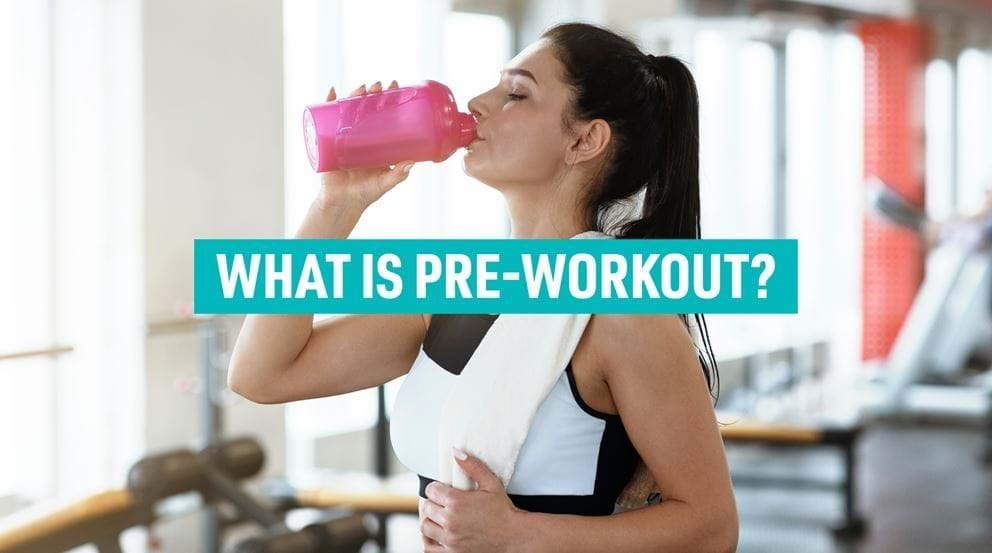What Is Pre-Workout And How Can It Help Your Exercise Energy Levels?

What Is Pre-Workout | Ingredients | Benefits | Is Pre-Workout Bad | When To Take | How To Take | Should Everyone Use | Creatine vs Pre-Workout | Dry Scooping
Exercise can be a great way to boost your energy levels, but what about when you have low energy levels before a workout? If you've been looking for ways to fuel your gym sessions, you might have come across pre workout and are wondering what it is, and whether you should be taking it.
Here, we're answering all your pre-workout questions so you can decide if it's right for you or not.
What Is Pre-Workout?
Pre-workout is a supplement that is designed to be taken around 30-60 minutes before exercising to boost your energy levels and increase your performance during a workout.
Pre-workout supplements come in several forms, but you'll commonly find it as pre workout powder or as tablets.
What Is In Pre-Workout?
Pre-workout is a broad term, and there isn't one set ingredient list. Most will contain caffeine, some will contain other substances designed to boost endurance or enhance energy -- we've covered some ingredients to look for below.
You can also find pre workout drinks that contain sugar to give a further energy boost, however a lot of pre-workouts have zero or minimal calories.
What To Look For In A Pre-Workout
There are hundreds, if not thousands, of pre-workout formulas to choose from, and some may be more effective than others. It's best to try a few different brands to see which is the best pre-workout for you, but some ingredients to look out for include:
Caffeine
This is present in most pre-workouts. It acts as stimulant and has been shown by studies to increase energy, power and endurance which can supercharge your workout
Creatine
Creatine is a compound which is naturally found in the body. It helps with energy production and muscular contractions, both which can help performance in the gym. It's one of the most widely studied supplements and has repeatedly been shown to help with exercise performance
Beta alanine
Beta alanine is an amino acid that has been found to enhance exercise performance. It is thought it works by preventing lactic acid build up in the muscles, which enables the person to workout longer
BCAAs
BCAAs, or branched chain amino acids, has been shown to enhance protein synthesis and aid in muscle recovery, as well as preserve muscle mass during a calorie deficit
What Are The Benefits Of Pre-Workout?
Because the ingredients of pre-workouts can vary so much, it's hard to say for certain what the benefits are. Most pre-workouts are designed to increase performance and endurance at a minimum, with many also including ingredients that aim to improve recovery times, delay fatigue, and increase muscle growth and strength, and increase power.
The main benefit people see from taking pre-workout is more energy which allows them to train at a higher intensity for longer, which can help with strength and hypertrophy goals.
Can Pre-Workout Be Bad For You?
Most pre-workouts are safe to take for the general population, however those with a caffeine sensitivity or heart issues may experience undesirable side effects like heart palpitations due to the high levels of caffeine.
Other side effects that have been reported include nausea, feeling jittery, tingling in the skin, and water retention. If you experience unwanted side effects, you can try pre-workouts with different ingredients, reducing the amount you take, or simply swapping pre-workout for a coffee and an energy boosting snack.
When Should You Take A Pre-Workout?
Most pre-workouts are designed to be taken around 30 minutes before exercising, as this allows enough time for the ingredients to be absorbed and kick in. This can differ by brand and product so check the instructions to make sure you're making the most of your pre-workout.
Caffeine peaks around 60 minutes after being consumed, so you'll get the best results 30-90 minutes after taking a pre-workout with caffeine in (or a cup of coffee).
How To Take Pre-Workout
Typically, pre workouts come in powder form, as tablets, or as a pre-made drink or snack. The pack will contain instructions on how to take that specific pre-workout, but it's typically consumed orally 30-60 minutes before your workout. Make sure when taking powders that you mix it with the correct amount of water, as using too little can increase the risk of stomach upset.
Should Everyone Take A Pre Workout Before Exercise?
Pre workouts can help with performance in the gym and recovery after a workout, but they're not essential. It's more important to prioritise a healthy, well-balanced diet, getting enough food throughout the day, and getting enough sleep. If you're doing this, you can easily replicate the effects of pre-workout with a cup of coffee!
That said, if you already do these things and want an extra boost in the gym, there's no harm in taking pre-workout for most people. If you tend to work out early in the day before you have had chance to eat a nutritious meal, pre-workouts can be helpful. If you are sensitive to caffeine, struggle with sleeping, or have heart issues, you may want to steer clear of pre-workouts or find a caffeine free version.
Is Pre-Workout The Same As Creatine?
Pre workout and creatine are different, although some pre-workouts do have creatine in them. While pre-workouts are designed to boost energy for an individual workout, creatine supplementation is used to improve strength and performance over longer periods of time.
Creatine occurs naturally in the muscle cells and helps the muscles to produce energy during high intensity exercise. Taking creatine as a supplement increases the amount stored in our bodies so that we can produce more energy during exercise. It also affects other cellular processes which can help with strength and muscle gains.
About 50% of the creatine in our bodies come from the diet, and the rest is made in the liver and kidneys frm amino acids. Taking creatine is not essential, as we can get plenty by eating a balanced diet (red meat and seafood are great sources of creatine). However, the supplement has been studied many times and has been shown to improve muscle gains, strength and exercise performance.
What Is Dry Scooping? And Is It Bad For You?
Dry scooping is a way of taking pre-workout that involves taking pre-workout powder orally straight from the pack, without diluting in water. This method became popular on Tiktok but is not one we'd recommend, as it can cause stomach issues and is a choking hazard, and even be inhaled and cause lung irritation.
In summary, pre-workout can be a helpful tool for healthy individuals who already eat a balanced diet and are looking for an extra boost before their workout, but it's by no means essential. Focusing on getting high quality nutrition throughout the day, 6-8 hours sleep every night, and getting the right amount of exercise (not too much, not too little) is enough for most people.
Learn more about fuelling your body with our guide to pre, during and post-workout nutrition here. If you need more help with your nutrition or training, why not work with a Personal Trainer? They can help you to reach your diet and fitness goals and provide expert advice tailored to your needs.
Ready to workout? Find your closest PureGym here and get started today.


